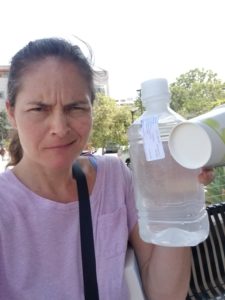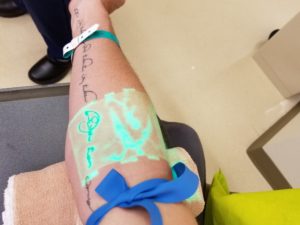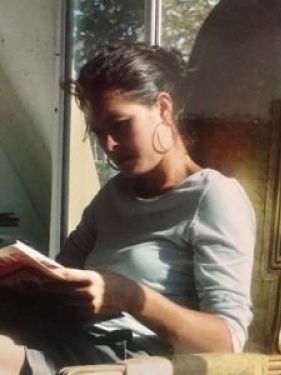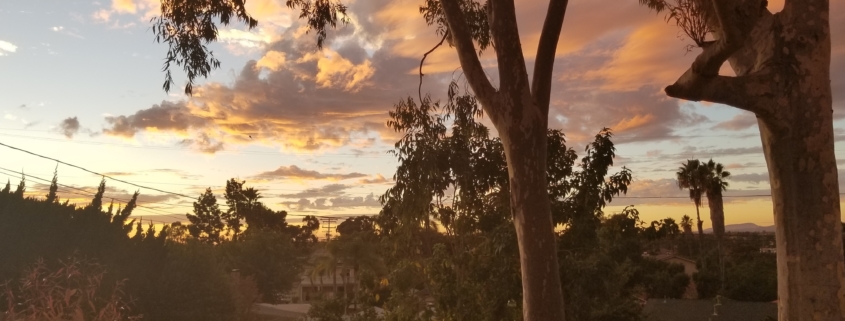Phantom
The radiology department lies deep in a basement of the Chao Cancer Center in Orange County. A nurse told me to arrive two hours early for my CAT Scan, so that I would have time to drink a liter of contrast, one cupful at a time. Once imbibed, the liquid would make my insides vivid and luminescent, so that when my body passed through the ring of the scan, I would be converted into light. A cylinder called a Phantom would revolve around me as I moved through that space. There is a Head Phantom and a Body Phantom.

Photo Credit: Mary Birnbaum
I’ve had night sweats for years, which are an odd symptom in that they can indicate a benign problem like “too many blankets,” but also Non-Hodgkin’s Lymphoma. I’ve had hormone panels done; I am not premenopausal. I’ve had biopsies and blood tests to rule out various other cancers and diseases. So now, through the CAT scan, a doctor would look for cancer in my neon lymphocytes. Where I entered the hospital fortress, a large banner proclaimed the Chao Center was proudly ANTI-CANCER, which alarmed me because I had really hoped that would go without saying.
Once I’d checked in, a nurse brought out a bottle of clear liquid so large that she had to pass it over with both hands. She gave me the drinking instructions, saying that I could stay in the waiting room or leave, they just needed me back in two hours. I received the bottle and cup and for about five seconds considered spending the next two hours in that basement. I took the elevator up to the main lobby and exited the building, back into the light of an astonishingly fine day. Doctors and nurses bustled around the grassy quad. The tails of their coats fluttered in the breeze. Birds swooped through air; the sky was full of their coo and call. At my feet, the sun made shaky lace of the tree shadows.
In the shadow of the building I took a picture of myself with the huge bottle of contrast. I had a heady, silly feeling. My chest was full of un-expelled laughter. The amount of suspicious liquid I was meant to drink and the beauty of the day, the strangers around me in varying stages of living and dying, mostly dying. The clouds and trees and the towering hospital in Maxfield Parrish light. Everything was ridiculous, everything was precious. I would be very sad to die.
In general I don’t have a good sense of how to address God, on a one-to-one basis, but earlier that morning, desperate and dizzy with fear, I’d texted my friend Emily, who has a special relationship with Jesus. I’d said “Can I prevail on your relationship with the big guy? I have to get a CT scan and I’m scared.” Mere seconds passed before I got a text back. She said, “Thank you for letting me know. Tell me your fears. Write them all down.”
This made me cry for two reasons. First, I was relieved to say my fear. The second reason was gratitude that I had a friend who could respond in such a way.
So I texted, “I don’t want to die and orphan my kids.”
“Haha,” I added. This is how bad I am at being solemn. This is why I rely on a religious surrogate.
I said, “I’m scared of the machine and the radiation and the poison I have to drink.”
“What else?” she said.
“I’m scared of my body dying too soon.”
“Yeah,” she said. “The unknown. All those things are unknowns. Unknowns are really hard, Mary. What are the knowns? What do we know?”
I said, “I think there are no knowns, except for being afraid.” And then because I wanted to stop crying, I said “We’re starting to sound like Donald Rumsfeld.”
She said she thought that was funny. Then she said that if I died she’d write a beautiful story about me, but that she would be the hero of the story. And I thought that was funny. Then she said, “Okay, I’m going to write you a prayer.” And she did, and sent it to me, and in her prayer, which was a long stream of words, I felt her holding my whole life. So I sunk down onto my kitchen floor and cried again.
* * *

Photo Credit: Mary Birnbaum
At the Cancer Center, not knowing what else to do, I tucked the contrast under my arm and crossed the street away from the hospital into the adjacent outlet mall. I walked around there for a while, drinking the liquid by the suggested increments. It occurred to me that, disheveled as I tend to be, in my hospital bracelet, chugging clear liquid from a handle, I resembled nothing so much as a mental patient on the lam. But I was adequately bloated by contrast when I returned to radiology for my scan. I lay on a table and I passed through the ring. The Phantom’s cylinder gyrated over me. It was very quick. The nurses were kind. I could expect results from my hematologist the following week.
That night, my husband went to a basketball game in a taxi. We live close to the arena. I baked cookies. I made three kinds and many batches. My daughters watched a movie. Afterward I put them to bed. I continued loading and unloading trays of cookies from the oven until about 9 p.m., at which point I put myself to bed.
At 2:30 a.m. I got up to pee and saw my husband was not in bed with me. On the way to the bathroom I checked the living room, where I expected to find him snoring in an armchair. He wasn’t. Sometimes if one of the children wakes up from a nightmare he will go in to comfort them and end up nodding off beside them. He wasn’t in the girls’ room. I checked my phone and saw a text from 11:30 p.m.—three hours earlier—saying that he was on his way home.
I called him several times, each time getting voicemail. I left a message asking where he was. I tried texting, but received no reply. I went to my laptop in the dining room and tried to log into his bank account to see where he last used his card, but couldn’t remember the password. We have separate checking accounts. I got the tax paperwork out to find his social security number so that I could break into his account by changing the password, but I was missing some additional security answer. I walked the circle from the dark dining room to the lit kitchen to the dark living room. From the dark, into the light, back to dark. On I walked and after a while the phone rang. I said “Hello?” I heard my husband’s voice, but he formed no words, only gibberish. “Where are you?” I said. He returned with more nonsense. Relief that he yet lived morphed quickly into rage. “Where are you?” The call ended.
For several minutes I tried calling him back. I didn’t know what else to do. I wondered whether I should call the police. Or his mom. Then the phone rang, bright and startling. The voice on the line said he was from the Orange County Sheriff’s department and asked if I was married to ____. I conceded that I was. He said that he’d found my husband in a gutter and that he seemed pretty intoxicated and didn’t know where he was. I asked where they were and the sheriff named a street I didn’t recognize. He said he didn’t really want to take my husband to the station and asked whether I could come there if I was given an address. I replied that I could whilst shoving my feet into flip flops and groping around for car keys. I entered the address into my phone and discovered that my husband was in a gutter just three blocks away. So I could leave the kids asleep in their beds while I retrieved him.
There is a sort of comical context for this situation, which is that for about thirteen years, maybe from the moment I started to date him, I had been telling my husband that I knew some day someone would call and say they’d found him in a gutter. A literal gutter. Maybe these are the ways we find out that God is listening.
I drove to the address that the Sheriff had given. On the way I thought, we are being given this chance because ____ is white. I also thought, this is the beginning or the end.
I reached him in under a minute. The street was a discotheque of cruiser lights. Three giant policemen stood with arms folded, leaning on their cars. My spouse sat at their feet. One of the gigantic cops took my information and asked if I would be able to care for my husband at home, since he seemed “pretty out of it.” I said I would. I didn’t say, “He’s a pretty docile drunk.” I didn’t say, my husband loves me and he loves our kids and he loves booze. He loves us all desperately, in a kind of self-erosion.
When we got home he refused to get out of the car and looked like he would curl up to sleep, so I left him in the driveway and went into my children’s room. I curled into bed next to my five-year-old daughter. And as I lay there, willing my body into unconsciousness, feeling ill from everything, but in particular all the contrast still in my system and the fact that my husband was pickling in a tiny Prius outside, I felt a sudden warm gush around my body’s edges. My daughter was peeing on us, rather torrentially.
When I told my husband I thought I was sick, he said “Every two years you think you’re dying.” I told him he was wrong, but I did not say he was wrong because really I’ve thought I was dying every day.
* * *
The next day Emily texted me to check in. She asked how I was holding up. I said fine, the CT scan was quick and painless. She asked if I had any super powers yet. I said no, haha, but guess what did happen. I told her about ____ and the cops. She said she guessed she forgot to pray that ____ wouldn’t wind up in the gutter.
The following week I returned to the Chao Center. My hematologist told me there is no intrathoracic neoplastic or infectious process; I don’t have any lymphoma. I wanted to write about it, about the relief or the lingering question of my body, but I was stuck. My giddy fear in the CT scan, the stress of collecting my spouse from the cops, these were unpleasant, especially as experienced within a twelve-hour span, but a spate of shitty events does not an essay make. Yet I couldn’t avoid that the miserable weekend felt like a closed event, a complete picture. I went around and around about it but didn’t know how to lay it down.
I formed a little answer, not precisely a known known, but I think it approaches truth. And like most of what makes sense here, it comes from Emily. While I was waiting to have my scan I sent her a picture of ____ being absurd, preening in a Disney necklace. I meant it to poke fun of him. She said, “You love your life and maybe you don’t know that yet. You adore it.”
I think it’s possible I fabricate illness and go to the doctor as a way of creating and controlling chaos. I love my spouse but like most drunks, he will not be managed or convinced, so instead I convince myself I’m sick and I go to the doctor over and over. For years, for an astonishing array of maladies, I go to be tested and controlled. I present my body on clinic tables, asking that doctors to solve my Self. I check myself in and out, trying to save our lives. Still, he drinks and drinks.
I requested that a copy of my scans be sent to my house, and when they arrived I looked at the images, enthralled by my unknown forms—the lit tree of veiny lungs, the darkness of huddled organs, the brightness of bone—everything suspended there by God or cascade of chance. Sicknesses erode us, invisible though they may be. Beautiful and breakable, a body is a ridiculous thing.
Emily says that when I texted her she sank to her knees and started to pray, which seems dramatic, but I know she did because in my mind I can vividly imagine it. I can almost feel my own knees touch Earth, like I am in her body, caring for me. I feel us say, Mercy. Mercy.
 Mary Birnbaum is the editor of the Diana Woods Memorial Award in creative nonfiction. She has served as Lunch Ticket blog editor and on the Gabo Prize and translation teams. She earned an MFA in creative nonfiction from Antioch University Los Angeles. She resides in San Diego, California. You can find her on Twitter @ailishbirnbaum
Mary Birnbaum is the editor of the Diana Woods Memorial Award in creative nonfiction. She has served as Lunch Ticket blog editor and on the Gabo Prize and translation teams. She earned an MFA in creative nonfiction from Antioch University Los Angeles. She resides in San Diego, California. You can find her on Twitter @ailishbirnbaum





